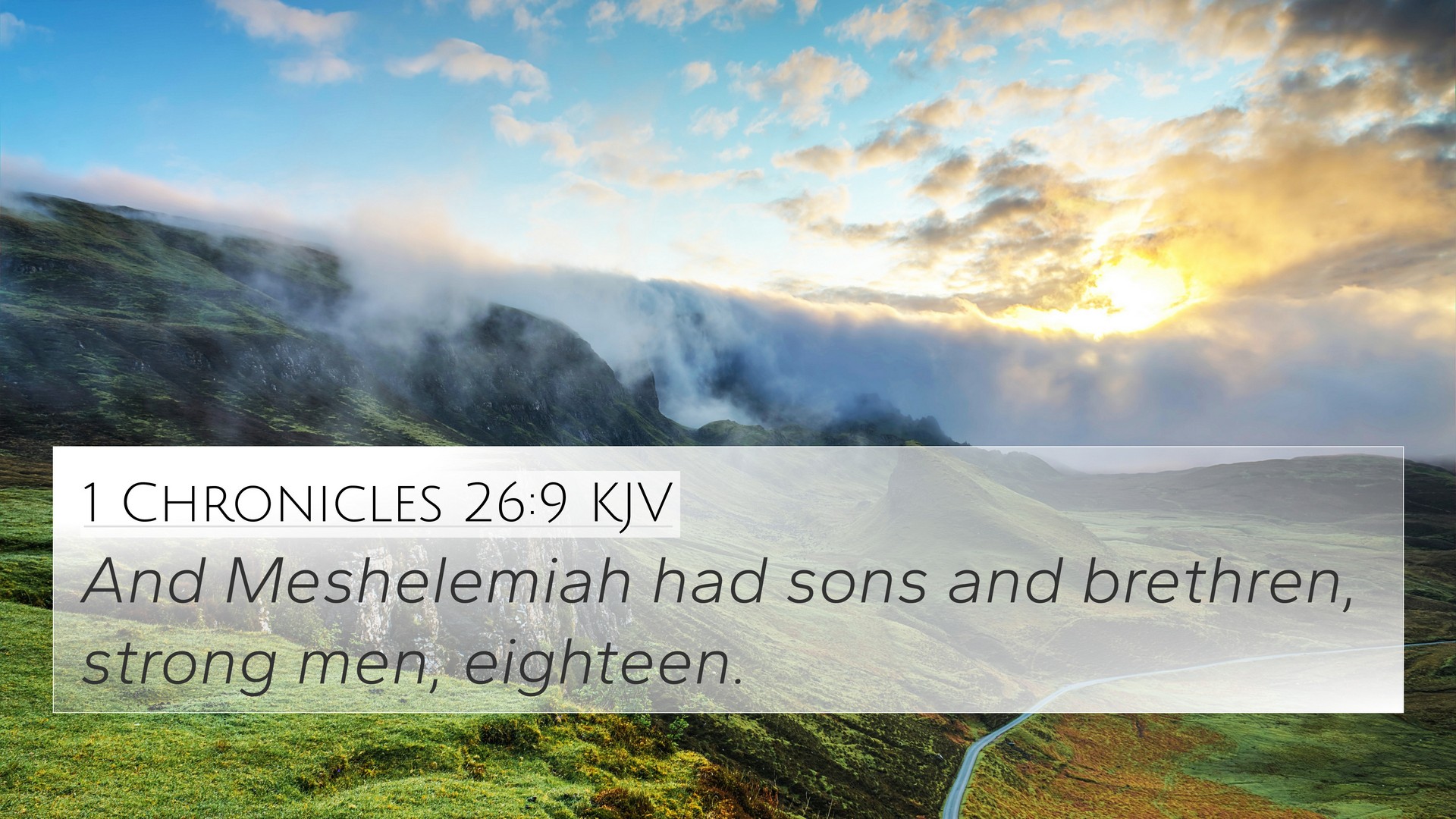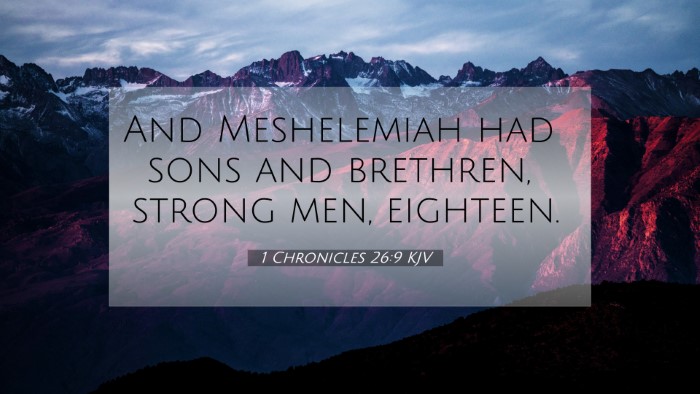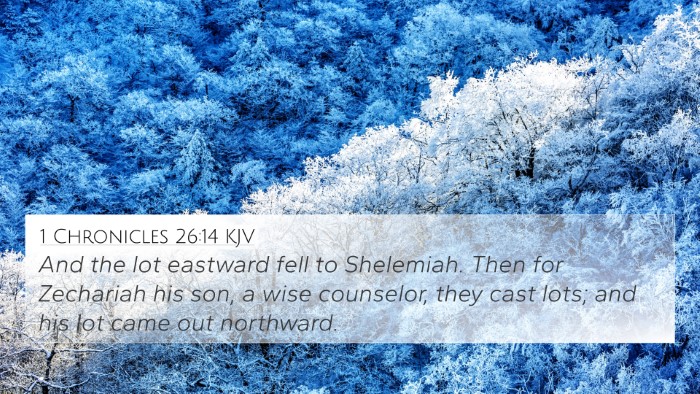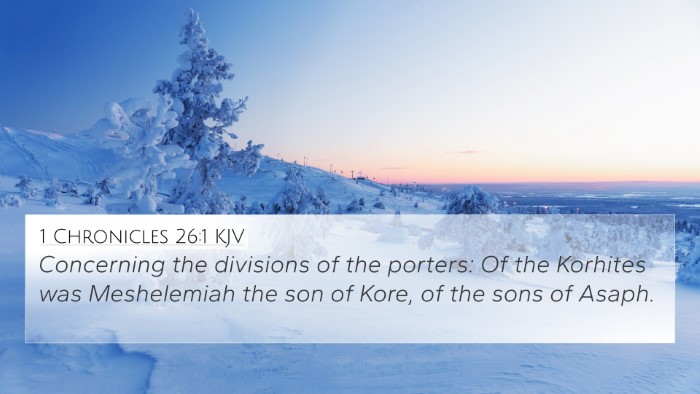Understanding 1 Chronicles 26:9
1 Chronicles 26:9 states, "The sons of Meshelemiah were, Zechariah the firstborn, Jediah the second, Zebadiah the third, Jatniel the fourth." This verse emphasizes the lineage and generational order of the gatekeepers assigned in the temple, revealing the importance placed on family and heritage within the context of service to God.
Combined interpretations from various public domain commentaries provide deeper insights into not just this verse, but its role in understanding temple duties and worship within the broader narrative of the Bible.
Significance of Gatekeepers
According to Matthew Henry, the role of gatekeepers was vital in maintaining the sanctity of the temple. They were tasked with overseeing who entered and exited, signifying the responsibility of guarding sacred spaces. This reveals a broader spiritual principle about the need for vigilance in spiritual matters.
Albert Barnes highlights that the listing of names indicates an organized structure within the temple service, teaching us about the order required in worship and service to God. Each name carries significance, not only reflecting familial pride but also civic duty in accountability to God’s house.
Adam Clarke points out that the detailed genealogies serve as a reminder of God’s faithfulness across generations, establishing a theological link between the past and the future of worship. Clarke suggests that this continuity fosters an understanding of belonging to a faith community that transcends time.
Connections to Other Bible Verses
The verse illustrates connections to various principles and themes found throughout scripture. Here are key cross-references that relate to 1 Chronicles 26:9:
- 2 Chronicles 23:4 - This verse also discusses the roles of gatekeepers and outlines structured responsibilities in temple service.
- 1 Chronicles 9:17-19 - This passage expands upon the duties of the gatekeepers, showing their importance in the overall worship system.
- Exodus 24:3 - Aligning the theme of order in worship, this verse describes how Israel was organized when responding to God’s commands.
- Nehemiah 11:19 - Reinforces the role of Levites and priests in serving at the gates, tying together the continuity of practice and responsibility.
- Psalm 84:10 - Expresses the value of being in the presence of God, which the gatekeepers protected in the temple context.
- Matthew 5:14 - The call for believers to be light in the world parallels the role of gatekeepers being watchful and guiding others.
- John 10:3-4 - Jesus identifies himself as the shepherd who calls his sheep by name, connecting the notion of care and guidance to the roles of guardians.
Thematic Reflections
Several themes emerge from a comparative Bible verse analysis that show the links between the roles of individuals in temple service and broader Biblical truths:
- Heritage in Service: The emphasis on names underlines a heritage of service faithful to God, seen throughout scripture from Old to New Testament.
- Community Role: Just as each gatekeeper had a specific role, Christians are called to find their place within the faith community.
- Spiritual Vigilance: The gatekeepers remind us of our duty to guard our faith, keeping our spiritual lives aligned with God's instructions.
- Generational Faithfulness: Continual service across generations affirms the importance of passing down faith traditions and teachings.
- The Order of Worship: The need for organized service reflects the overarching Biblical principle that God is a God of order, not chaos.
Using Bible Cross-Referencing for Deeper Understanding
As seen, cross-referencing biblical texts adds layers of meaning. Here are some tools and methods that can aid in cross-reference Bible study:
- Bible Concordance: Useful for finding specific words and their many occurrences throughout scripture.
- Bible Cross-Reference Guide: This tool provides quick links between verses that speak on similar themes or concepts.
- Cross-reference Bible Study Methods: Encourages using multiple verses for in-depth study on a topic, enhancing understanding.
- Comprehensive Bible Cross-Reference Materials: A thorough collection can weave together narratives, themes, and laws presented across texts.
- Finding Cross-References in the Bible: Seeking specific themes or words to discover connections reveals the unity of scripture.
Conclusion
This exploration of 1 Chronicles 26:9 demonstrates the richness of connecting verses through cross-references and thematic analysis. Understanding the roles outlined in genealogy not only enriches one’s study of Old Testament worship but also invites believers to reflect on their own roles in faith communities today.
These insights illustrate how the Bible is not isolated books, but a tapestry of teachings interwoven together through God’s divine revelation, providing a comprehensive guide for spiritual living.




